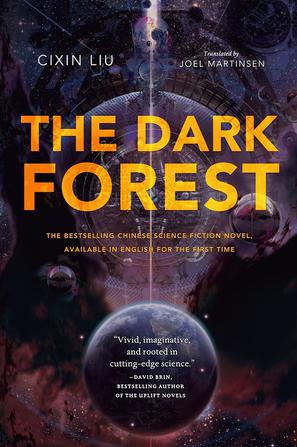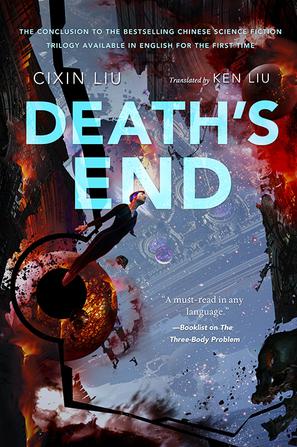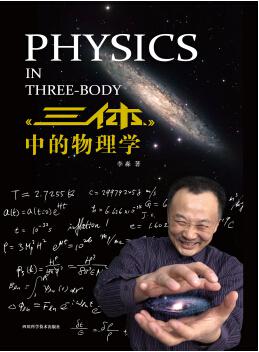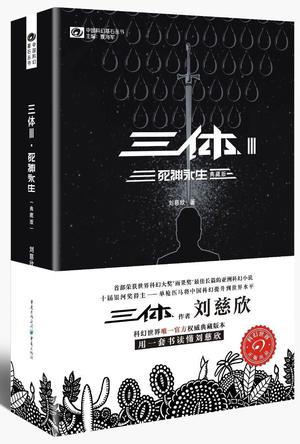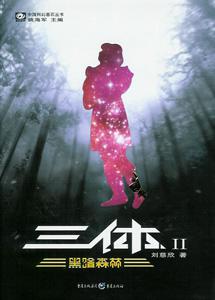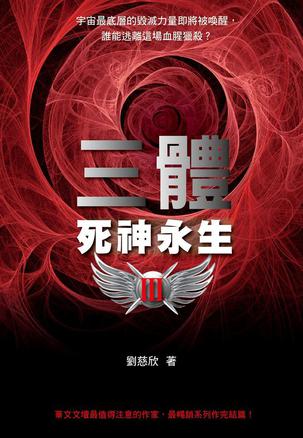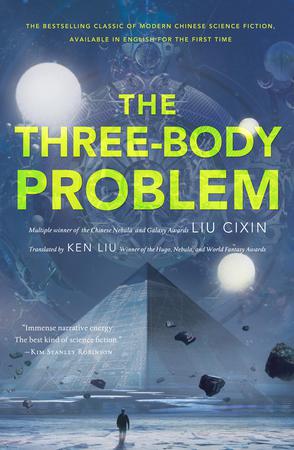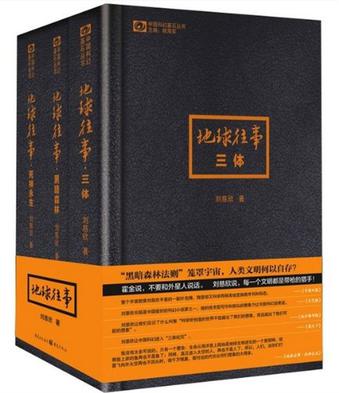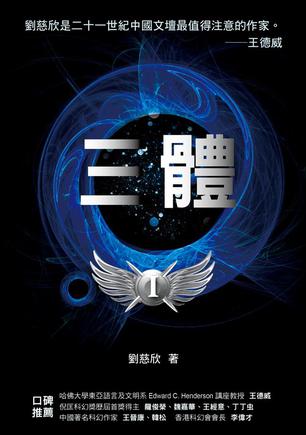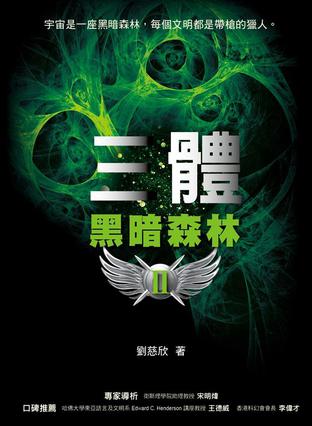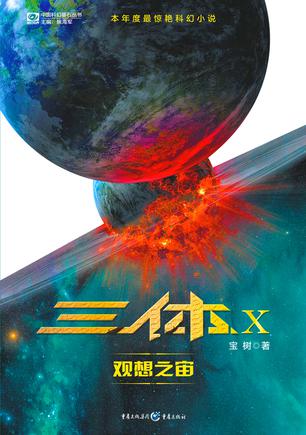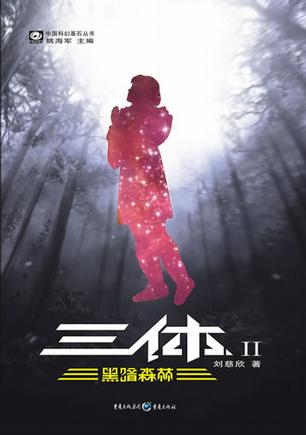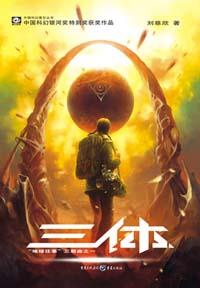欢迎来到相识电子书!
标签:三体
-
The Dark Forest
With the scope of Dune, and the rousing action of Independence Day, this near-future trilogy is the first chance for English-speaking readers to experience this multiple award-winning phenomenon from China’s most beloved science fiction author. In the second book in the series, Earth is reeling from the revelation of a coming alien invasion in just four centuries’ time. The aliens’ human collaborators may have been defeated, but the presence of the sophons, the subatomic particles that allow Trisolaris instant access to all human information, means that Earth’s defense plans are totally exposed to the enemy. Only the human mind remains a secret. This is the motivation for the Wallfacer Project, a daring plan that grants four men enormous resources to design secret strategies hidden through deceit and misdirection from Earth and Trisolaris alike. Three of the Wallfacers are influential statesmen and scientists, but the fourth is a total unknown. LuoJi, an unambitious Chinese astronomer and sociologist, is baffled by his new status. All he knows is that he’s the one Wallfacer that Trisolaris wants dead. -
Death's End
With The Three-Body Problem, English-speaking readers got their first chance to experience the multiple-award-winning and bestselling Three-Body Trilogy by China's most beloved science fiction author, Cixin Liu. Three-Body was released to great acclaim including coverage in The New York Times and The Wall Street Journal. It was also named a finalist for the Nebula Award, making it the first translated novel to be nominated for a major SF award since Italo Calvino's Invisible Cities in 1976. Now this epic trilogy concludes with Death's End. Half a century after the Doomsday Battle, the uneasy balance of Dark Forest Deterrence keeps the Trisolaran invaders at bay. Earth enjoys unprecedented prosperity due to the infusion of Trisolaran knowledge. With human science advancing daily and the Trisolarans adopting Earth culture, it seems that the two civilizations will soon be able to co-exist peacefully as equals without the terrible threat of mutually assured annihilation. But the peace has also made humanity complacent. Cheng Xin, an aerospace engineer from the early 21st century, awakens from hibernation in this new age. She brings with her knowledge of a long-forgotten program dating from the beginning of the Trisolar Crisis, and her very presence may upset the delicate balance between two worlds. Will humanity reach for the stars or die in its cradle? -
《三体》中的物理学
《<三体>中的物理学》是一部奇特而富于妙趣的科普书。作者作为理论物理学家,从近年来在世界范围内产生广泛影响的科幻小说《三体》切入,生动展现了宇宙的生死、世界的实在性和不确定性,乃至人的自由意志;同时系统分析了智子、水滴、二向箔、思想钢印等《三体》中诸多超级神器在未来出现的可能性。 如果你因为《三体》而读这本书,这是一个绝佳的选择,因为你会从中找到由《三体》引发的所有重大问题的权威答案;如果你还没有读过《三体》但对世界充满好奇,这本书同样是不错的选择,它会帮助你进入一个奇异的新世界。 《<三体>中的物理学》以独立的批判姿态,验证了《三体》的神奇与伟大。 -
三體 Ⅲ
◆二十一世紀中國文壇最值得注意的作家——劉慈欣,最暢銷系列作完結篇! 二○○六年,《三體》開始在《科幻世界》雜誌連載,引起熱烈迴響;二○一○年,《三體Ⅲ:死神永生》在中國上市,首刷十萬本,甫上市立即銷售一空、緊急再刷。在台灣,《三體》第一部尚未出版,試讀迴響踴躍,也在批踢踢形成「洗版」現象。「三體」不但是華文科幻的最熱話題,劉慈欣更成為第一個被好萊塢買下電影改編權的華文科幻作家! 劉慈欣在中國擁有數量龐大的擁護者,王德威譽為「二十一世紀中國文壇最值得注意的作家」。《三體》系列所展現的開闊格局,將華文科幻帶向前所未有的高度。劉慈欣之於科幻,如同金庸之於武俠,都將類型小說寫出了迥異於以往的恢弘格局。他筆下的許多人物角色,也深植書迷心中,令人神往。 宇宙最底層的毀滅力量即將被喚醒,誰能逃離這場慘烈的獵殺? 與三體文明的戰爭讓人類第一次看見宇宙黑暗的真相,地球文明像一個恐懼的孩子,熄滅了尋友的希望,在暗夜中瑟瑟發抖。 為了與三體文明抗衡,地球文明選出了掌握全人類命運的「執劍人」。執劍人終日鎮守著一個開關——這個開關主宰了兩個世界的戰略平衡,當危機來臨時,執劍人必須毅然按下毀滅世界的按鈕,讓兩個文明同歸於盡。 第一代執劍人羅輯孤寂地堅守崗位,緊握著每一秒都一觸即發的地雷,維持著兩個世界的恐怖平衡。半個世紀的漫長歲月過去了,羅輯終於完成他的使命,新一代的執劍人也即將誕生。然而就在此時,宇宙最底層的毀滅力量卻悄悄地被喚醒…… 三體系列:《三體》、《三體II:黑暗森林》、《三體III:死神永生》 -
The Three-Body Problem
Three-Body Problem is the first chance for English-speaking readers to experience this multiple award winning phenomenon from China’s most beloved science fiction author, Liu Cixin. Set against the backdrop of China’s Cultural Revolution, a secret military project sends signals into space to establish contact with aliens. An alien civilization on the brink of destruction captures the signal and plans to invade Earth. Meanwhile, on Earth, different camps start forming, planning to either welcome the superior beings and help them take over a world seen as corrupt, or to fight against the invasion. The result is a science fiction masterpiece of enormous scope and vision. ___________________________________________________________________________Excerpt. © Reprinted by permission. All rights reserved. 1 The Madness Years China, 1967 The Red Union had been attacking the headquarters of the April Twenty-eighth Brigade for two days. Their red flags fluttered restlessly around the brigade building like flames yearning for firewood. The Red Union commander was anxious, though not because of the defenders he faced. The more than two hundred Red Guards of the April Twenty-eighth Brigade were mere greenhorns compared with the veteran Red Guards of the Red Union, which was formed at the start of the Great Proletarian Cultural Revolution in early 1966. The Red Union had been tempered by the tumultuous experience of revolutionary tours around the country and seeing Chairman Mao in the great rallies in Tiananmen Square. But the commander was afraid of the dozen or so iron stoves inside the building, filled with explosives and connected to each other by electric detonators. He couldn’t see them, but he could feel their presence like iron sensing the pull of a nearby magnet. If a defender flipped the switch, revolutionaries and counter-revolutionaries alike would all die in one giant ball of fire. And the young Red Guards of the April Twenty-eighth Brigade were indeed capable of such madness. Compared with the weathered men and women of the first generation of Red Guards, the new rebels were a pack of wolves on hot coals, crazier than crazy. The slender figure of a beautiful young girl emerged at the top of the building, waving the giant red banner of the April Twenty-eighth Brigade. Her appearance was greeted immediately by a cacophony of gunshots. The weapons attacking her were a diverse mix: antiques such as American carbines, Czech-style machine guns, Japanese Type-38 rifles; newer weapons such as standard-issue People’s Liberation Army rifles and submachine guns, stolen from the PLA after the publication of the “August Editorial”1; and even a few Chinese dadao swords and spears. Together, they formed a condensed version of modern history. Numerous members of the April Twenty-eighth Brigade had engaged in similar displays before. They’d stand on top of the building, wave a flag, shout slogans through megaphones, and scatter flyers at the attackers below. Every time, the courageous man or woman had been able to retreat safely from the hailstorm of bullets and earn glory for their valor. The new girl clearly thought she’d be just as lucky. She waved the battle banner as though brandishing her burning youth, trusting that the enemy would be burnt to ashes in the revolutionary flames, imagining that an ideal world would be born tomorrow from the ardor and zeal coursing through her blood.… She was intoxicated by her brilliant, crimson dream until a bullet pierced her chest. Her fifteen-year-old body was so soft that the bullet hardly slowed down as it passed through it and whistled in the air behind her. The young Red Guard tumbled down along with her flag, her light form descending even more slowly than the piece of red fabric, like a little bird unwilling to leave the sky. The Red Union warriors shouted in joy. A few rushed to the foot of the building, tore away the battle banner of the April Twenty-eighth Brigade, and seized the slender, lifeless body. They raised their trophy overhead and flaunted it for a while before tossing it toward the top of the metal gate of the compound. Most of the gate’s metal bars, capped with sharp tips, had been pulled down at the beginning of the factional civil wars to be used as spears, but two still remained. As their sharp tips caught the girl, life seemed to return momentarily to her body. The Red Guards backed up some distance and began to use the impaled body for target practice. For her, the dense storm of bullets was now no different from a gentle rain, as she could no longer feel anything. From time to time, her vinelike arms jerked across her body softly, as though she were flicking off drops of rain. And then half of her young head was blown away, and only a single, beautiful eye remained to stare at the blue sky of 1967. There was no pain in that gaze, only solidified devotion and yearning. And yet, compared to some others, she was fortunate. At least she died in the throes of passionately sacrificing herself for an ideal. * * * Battles like this one raged across Beijing like a multitude of CPUs working in parallel, their combined output, the Cultural Revolution. A flood of madness drowned the city and seeped into every nook and cranny. At the edge of the city, on the exercise grounds of Tsinghua University, a mass “struggle session” attended by thousands had been going on for nearly two hours. This was a public rally intended to humiliate and break down the enemies of the revolution through verbal and physical abuse until they confessed to their crimes before the crowd. As the revolutionaries had splintered into numerous factions, opposing forces everywhere engaged in complex maneuvers and contests. Within the university, intense conflicts erupted between the Red Guards, the Cultural Revolution Working Group, the Workers’ Propaganda Team, and the Military Propaganda Team. And each faction divided into new rebel groups from time to time, each based on different backgrounds and agendas, leading to even more ruthless fighting. But for this mass struggle session, the victims were the reactionary bourgeois academic authorities. These were the enemies of every faction, and they had no choice but to endure cruel attacks from every side. Compared to other “Monsters and Demons,”2 reactionary academic authorities were special: During the earliest struggle sessions, they had been both arrogant and stubborn. That was also the stage in which they had died in the largest numbers. Over a period of forty days, in Beijing alone, more than seventeen hundred victims of struggle sessions were beaten to death. Many others picked an easier path to avoid the madness: Lao She, Wu Han, Jian Bozan, Fu Lei, Zhao Jiuzhang, Yi Qun, Wen Jie, Hai Mo, and other once-respected intellectuals had all chosen to end their lives.3 Those who survived that initial period gradually became numb as the ruthless struggle sessions continued. The protective mental shell helped them avoid total breakdown. They often seemed to be half asleep during the sessions and would only startle awake when someone screamed in their faces to make them mechanically recite their confessions, already repeated countless times. Then, some of them entered a third stage. The constant, unceasing struggle sessions injected vivid political images into their consciousness like mercury, until their minds, erected upon knowledge and rationality, collapsed under the assault. They began to really believe that they were guilty, to see how they had harmed the great cause of the revolution. They cried, and their repentance was far deeper and more sincere than that of those Monsters and Demons who were not intellectuals. For the Red Guards, heaping abuse upon victims in those two latter mental stages was utterly boring. Only those Monsters and Demons who were still in the initial stage could give their overstimulated brains the thrill they craved, like the red cape of the matador. But such desirable victims had grown scarce. In Tsinghua there was probably only one left. Because he was so rare, he was reserved for the very end of the struggle session. Ye Zhetai had survived the Cultural Revolution so far, but he remained in the first mental stage. He refused to repent, to kill himself, or to become numb. When this physics professor walked onto the stage in front of the crowd, his expression clearly said: Let the cross I bear be even heavier. The Red Guards did indeed have him carry a burden, but it wasn’t a cross. Other victims wore tall hats made from bamboo frames, but his was welded from thick steel bars. And the plaque he wore around his neck wasn’t wooden, like the others, but an iron door taken from a laboratory oven. His name was written on the door in striking black characters, and two red diagonals were drawn across them in a large X. Twice the number of Red Guards used for other victims escorted Ye onto the stage: two men and four women. The two young men strode with confidence and purpose, the very image of mature Bolshevik youths. They were both fourth-year students4 majoring in theoretical physics, and Ye was their professor. The women, really girls, were much younger, second-year students from the junior high school attached to the university.5 Dressed in military uniforms and equipped with bandoliers, they exuded youthful vigor and surrounded Ye Zhetai like four green flames. His appearance excited the crowd. The shouting of slogans, which had slackened a bit, now picked up with renewed force and drowned out everything else like a resurgent tide. After waiting patiently for the noise to subside, one of the male Red Guards turned to the victim. “Ye Zhetai, you are an expert in mechanics. You should see how strong the great unified force you’re resisting is. To remain so stubborn will lead only to your death! Today, we will continue the agenda from the last time. There’s no need to waste words. Answer the following question without your typical deceit: Between the years of 1962 and 1965, did you not decide on your own to add relativity to the intro physics course?” “Relativity is part of the fundamental theories of physics,” Ye answered. “How can a basic survey course not teach it?” “You lie!” a female Red Guard by his side shouted. “Einstein is a reactionary academic authority. He would serve any master who dangled money in front of him. He even went to the American Imperialists and helped them build the atom bomb! To develop a revolutionary science, we must overthrow the black banner of capitalism represented by the theory of relativity!” Ye remained silent. Enduring the pain brought by the heavy iron hat and the iron plaque hanging from his neck, he had no energy to answer questions that were not worth answering. Behind him, one of his students also frowned. The girl who had spoken was the most intelligent of the four female Red Guards, and she was clearly prepared, as she had been seen memorizing the struggle session script before coming onstage. But against someone like Ye Zhetai, a few slogans like that were insufficient. The Red Guards decided to bring out the new weapon they had prepared against their teacher. One of them waved to someone offstage. Ye’s wife, physics professor Shao Lin, stood up from the crowd’s front row. She walked onto the stage dressed in an ill-fitting green outfit, clearly intended to imitate the military uniform of the Red Guards. Those who knew her remembered that she had often taught class in an elegant qipao, and her current appearance felt forced and awkward. “Ye Zhetai!” She was clearly unused to such theater, and though she tried to make her voice louder, the effort magnified the tremors in it. “You didn’t think I would stand up and expose you, criticize you? Yes, in the past, I was fooled by you. You covered my eyes with your reactionary view of the world and science! But now I am awake and alert. With the help of the revolutionary youths, I want to stand on the side of the revolution, the side of the people!” She turned to face the crowd. “Comrades, revolutionary youths, revolutionary faculty and staff, we must clearly understand the reactionary nature of Einstein’s theory of relativity. This is most apparent in general relativity: Its static model of the universe negates the dynamic nature of matter. It is anti-dialectical! It treats the universe as limited, which is absolutely a form of reactionary idealism.…” As he listened to his wife’s lecture, Ye allowed himself a wry smile. Lin, I fooled you? Indeed, in my heart you’ve always been a mystery. One time, I praised your genius to your father—he’s lucky to have died early and escaped this catastrophe—and he shook his head, telling me that he did not think you would ever achieve much academically. What he said next turned out to be so important to the second half of my life: “Lin Lin is too smart. To work in fundamental theory, one must be stupid.” In later years, I began to understand his words more and more. Lin, you truly are too smart. Even a few years ago, you could feel the political winds shifting in academia and prepared yourself. For example, when you taught, you changed the names of many physical laws and constants: Ohm’s law you called resistance law, Maxwell’s equations you called electromagnetic equations, Planck’s constant you called the quantum constant.… You explained to your students that all scientific accomplishments resulted from the wisdom of the working masses, and those capitalist academic authorities only stole these fruits and put their names on them. But even so, you couldn’t be accepted by the revolutionary mainstream. Look at you now: You’re not allowed to wear the red armband of the “revolutionary faculty and staff”; you had to come up here empty-handed, without the status to carry a Little Red Book.… You can’t overcome the fault of being born to a prominent family in pre-revolutionary China and of having such famous scholars as parents. But you actually have more to confess about Einstein than I do. In the winter of 1922, Einstein visited Shanghai. Because your father spoke fluent German, he was asked to accompany Einstein on his tour. You told me many times that your father went into physics because of Einstein’s encouragement, and you chose physics because of your father’s influence. So, in a way, Einstein can be said to have indirectly been your teacher. And you once felt so proud and lucky to have such a connection. Later, I found out that your father had told you a white lie. He and Einstein had only one very brief conversation. The morning of November 13, 1922, he accompanied Einstein on a walk along Nanjing Road. Others who went on the walk included Yu Youren, president of Shanghai University, and Cao Gubing, general manager of the newspaper Ta Kung Pao. When they passed a maintenance site in the road bed, Einstein stopped next to a worker who was smashing stones and silently observed this boy with torn clothes and dirty face and hands. He asked your father how much the boy earned each day. After asking the boy, he told Einstein: five cents. This was the only time he spoke with the great scientist who changed the world. There was no discussion of physics, of relativity, only cold, harsh reality. According to your father, Einstein stood there for a long time after hearing the answer, watching the boy’s mechanical movements, not even bothering to smoke his pipe as the embers went out. After your father recounted this memory to me, he sighed and said, “In China, any idea that dared to take flight would only crash back to the ground. The gravity of reality is too strong.” “Lower your head!” one of the male Red Guards shouted. This may actually have been a gesture of mercy from his former student. All victims being struggled against were supposed to lower their heads. If Ye did lower his head, the tall, heavy iron hat would fall off, and if he kept his head lowered, there would be no reason to put it back on him. But Ye refused and held his head high, supporting the heavy weight with his thin neck. “Lower your head, you stubborn reactionary!” One of the girl Red Guards took off her belt and swung it at Ye. The copper belt buckle struck his forehead and left a clear impression that was quickly blurred by oozing blood. He swayed unsteadily for a few moments, then stood straight and firm again. One of the male Red Guards said, “When you taught quantum mechanics, you also mixed in many reactionary ideas.” Then he nodded at Shao Lin, indicating that she should continue. Shao was happy to oblige. She had to keep on talking, otherwise her fragile mind, already hanging on only by a thin thread, would collapse completely. “Ye Zhetai, you cannot deny this charge! You have often lectured students on the reactionary Copenhagen interpretation of quantum mechanics.” “It is, after all, the explanation recognized to be most in line with experimental results.” His tone, so calm and collected, surprised and frightened Shao Lin. “This explanation posits that external observation leads to the collapse of the quantum wave function. This is another expression of reactionary idealism, and it’s indeed the most brazen expression.” “Should philosophy guide experiments, or should experiments guide philosophy?” Ye’s sudden counterattack shocked those leading the struggle session. For a moment they did not know what to do. “Of course it should be the correct philosophy of Marxism that guides scientific experiments!” one of the male Red Guards finally said. “Then that’s equivalent to saying that the correct philosophy falls out of the sky. This is against the idea that the truth emerges from experience. It’s counter to the principles of how Marxism seeks to understand nature.” Shao Lin and the two college student Red Guards had no answer for this. Unlike the Red Guards who were still in junior high school, they couldn’t completely ignore logic. But the four junior high girls had their own revolutionary methods that they believed were invincible. The girl who had hit Ye before took out her belt and whipped Ye again. The other three girls also took off their belts to strike at Ye. With their companion displaying such revolutionary fervor, they had to display even more, or at least the same amount. The two male Red Guards didn’t interfere. If they tried to intervene now, they would be suspected of being insufficiently revolutionary. “You also taught the big bang theory. This is the most reactionary of all scientific theories.” One of the male Red Guards spoke up, trying to change the subject. “Maybe in the future this theory will be disproven. But two great cosmological discoveries of this century—Hubble’s law, and observation of the cosmic microwave background–show that the big bang theory is currently the most plausible explanation for the origin of the universe.” “Lies!” Shao Lin shouted. Then she began a long lecture about the big bang theory, remembering to splice in insightful critiques of the theory’s extremely reactionary nature. But the freshness of the theory attracted the most intelligent of the four girls, who couldn’t help but ask, “Time began with the singularity? So what was there before the singularity?” “Nothing,” Ye said, the way he would answer a question from any curious young person. He turned to look at the girl kindly. With his injuries and the tall iron hat, the motion was very difficult. “No … nothing? That’s reactionary! Completely reactionary!” the frightened girl shouted. She turned to Shao Lin, who gladly came to her aid. “The theory leaves open a place to be filled by God.” Shao nodded at the girl. The young Red Guard, confused by these new thoughts, finally found her footing. She raised her hand, still holding the belt, and pointed at Ye. “You: you’re trying to say that God exists?” “I don’t know.” “What?” “I’m saying I don’t know. If by ‘God’ you mean some kind of superconsciousness outside the universe, I don’t know if it exists or not. Science has given no evidence either way.” Actually, in this nightmarish moment, Ye was leaning toward believing that God did not exist. This extremely reactionary statement caused a commotion in the crowd. Led by one of the Red Guards on stage, another tide of slogan-shouting exploded. “Down with reactionary academic authority Ye Zhetai!” “Down with all reactionary academic authorities!” “Down with all reactionary doctrines!” Once the slogans died down, the girl shouted, “God does not exist. All religions are tools concocted by the ruling class to paralyze the spirit of the people!” “That is a very one-sided view,” Ye said calmly. The young Red Guard, embarrassed and angry, reached the conclusion that, against this dangerous enemy, all talk was useless. She picked up her belt and rushed at Ye, and her three companions followed. Ye was tall, and the four fourteen-year-olds had to swing their belts upward to reach his head, still held high. After a few strikes, the tall iron hat, which had protected him a little, fell off. The continuing barrage of strikes by the metal buckles finally made him fall down. The young Red Guards, encouraged by their success, became even more devoted to this glorious struggle. They were fighting for faith, for ideals. They were intoxicated by the bright light cast on them by history, proud of their own bravery.… Ye’s two students had finally had enough. “The chairman instructed us to ‘rely on eloquence rather than violence’!” They rushed over and pulled the four semicrazed girls off Ye. But it was already too late. The physicist lay quietly on the ground, his eyes still open as blood oozed from his head. The frenzied crowd sank into silence. The only thing that moved was a thin stream of blood. Like a red snake, it slowly meandered across the stage, reached the edge, and dripped onto a chest below. The rhythmic sound made by the blood drops was like the steps of someone walking away. A cackling laugh broke the silence. The sound came from Shao Lin, whose mind had finally broken. The laughter frightened the attendees, who began to leave the struggle session, first in trickles, and then in a flood. The exercise grounds soon emptied, leaving only one young woman below the stage. She was Ye Wenjie, Ye Zhetai’s daughter. As the four girls were taking her father’s life, she had tried to rush onto the stage. But two old university janitors held her down and whispered into her ear that she would lose her own life if she went. The mass struggle session had turned into a scene of madness, and her appearance would only incite more violence. She had screamed and screamed, but she had been drowned out by the frenzied waves of slogans and cheers. When it was finally quiet again, she was no longer capable of making any sound. She stared at her father’s lifeless body, and the thoughts she could not voice dissolved into her blood, where they would stay with her for the rest of her life. After the crowd dispersed, she remained like a stone statue, her body and limbs in the positions they were in when the two old janitors had held her back. After a long time, she finally let her arms down, walked slowly onto the stage, sat next to her father’s body, and held one of his already-cold hands, her eyes staring emptily into the distance. When they finally came to carry away the body, she took something from her pocket and put it into her father’s hand: his pipe. Wenjie quietly left the exercise grounds, empty save for the trash left by the crowd, and headed home. When she reached the foot of the faculty housing apartment building, she heard peals of crazy laughter coming out of the second-floor window of her home. That was the woman she had once called mother. Wenjie turned around, not caring where her feet would carry her. Finally, she found herself at the door of Professor Ruan Wen. Throughout the four years of Wenjie’s college life, Professor Ruan had been her advisor and her closest friend. During the two years after that, when Wenjie had been a graduate student in the Astrophysics Department, and through the subsequent chaos of the Cultural Revolution, Professor Ruan remained her closest confidante, other than her father. Ruan had studied at Cambridge University, and her home had once fascinated Wenjie: refined books, paintings, and records brought back from Europe; a piano; a set of European-style pipes arranged on a delicate wooden stand, some made from Mediterranean briar, some from Turkish meerschaum. Each of them seemed suffused with the wisdom of the man who had once held the bowl in his hand or clamped the stem between his teeth, deep in thought, though Ruan had never mentioned the man’s name. The pipe that had belonged to Wenjie’s father had in fact been a gift from Ruan. This elegant, warm home had once been a safe harbor for Wenjie when she needed to escape the storms of the larger world, but that was before Ruan’s home had been searched and her possessions seized by the Red Guards. Like Wenjie’s father, Ruan had suffered greatly during the Cultural Revolution. During her struggle sessions, the Red Guards had hung a pair of high heels around her neck and streaked her face with lipstick to show how she had lived the corrupt lifestyle of a capitalist. Wenjie pushed open the door to Ruan’s home, and she saw that the chaos left by the Red Guards had been cleaned up: The torn oil paintings had been glued back together and rehung on the walls; the toppled piano had been set upright and wiped clean, though it was broken and could no longer be played; the few books left behind had been put back neatly on the shelf.… Ruan was sitting on the chair before her desk, her eyes closed. Wenjie stood next to Ruan and gently caressed her professor’s forehead, face, and hands—all cold. Wenjie had noticed the empty sleeping pill bottle on the desk as soon as she came in. She stood there for a while, silent. Then she turned and walked away. She could no longer feel grief. She was now like a Geiger counter that had been subjected to too much radiation, no longer capable of giving any reaction, noiselessly displaying a reading of zero. But as she was about to leave Ruan’s home, Wenjie turned around for a final look. She noticed that Professor Ruan had put on makeup. She was wearing a light coat of lipstick and a pair of high heels. Copyright © 2006 by (Liu Cixin) -
地球往事
三体三部曲 (《三体》《三体Ⅱ·黑暗森林》《三体Ⅲ·死神永生》) ,原名“地球往事三部曲”,是中国著名科幻作家刘慈欣的首个长篇系列,由科幻世界杂志社策划制作,重庆出版集团出版。小说讲述了文革期间一次偶然的星际通讯引发的三体世界对地球的入侵以及之后人类文明与三体文明三百多年的恩怨情仇。三体三部曲出版后十分畅销,并深受读者和主流媒体好评,被普遍认为是中国科幻文学的里程碑之作,为中国科幻确立了一个新高度。 《三体》 文化大革命如火如荼进行的同时。军方探寻外星文明的绝秘计划“红岸工程”取得了突破性进展。但在按下发射键的那一刻,历经劫难的叶文洁没有意识到,她彻底改变了人类的命运。地球文明向宇宙发出的第一声啼鸣,以太阳为中心,以光速向宇宙深处飞驰…… 四光年外,“三体文明”正苦苦挣扎——三颗无规则运行的太阳主导下的百余次毁灭与重生逼迫他们逃离母星。而恰在此时。他们接收到了地球发来的信息。在运用超技术锁死地球人的基础科学之后。三体人庞大的宇宙舰队开始向地球进发…… 人类的末日悄然来临。 《三体Ⅱ·黑暗森林》 三体人在利用魔法般的科技锁死了地球人的科学之后,庞大的宇宙舰队杀气腾腾地直扑太阳系,意欲清除地球文明。 面对前所未有的危局,经历过无数磨难的地球人组建起同样庞大的太空舰队,同时,利用三体人思维透明的致命缺陷,制订了神秘莫测的“面壁计划”,精选出四位“面壁者”。秘密展开对三体人的反击。三体人自身虽然无法识破人类的诡谲计谋,却依靠由地球人中的背叛者挑选出的“破壁人”,与“面壁者”展开智慧博弈…… “面壁计划”究竟能否成功?地球人究竟能否在这场你死我活的文明生存竞争中战而胜之?神秘的“黑暗森林”究竟意味着什么? 《三体Ⅲ·死神永生》 与三体文明的战争使人类第一次看到了宇宙黑暗的真相,地球文明像一个恐惧的孩子,熄灭了寻友的篝火,在暗夜中发抖。自以为历经沧桑,其实刚刚蹒跚学步;自以为悟出了生存竞争的秘密,其实还远没有竞争的资格。 使两个文明命悬一线的黑暗森林打击,不过是宇宙战场上一个微不足道的插曲。真正的星际战争没人见过,也不可能见到,因为战争的方式和武器已经远远超出人类的想象,目睹战场之日,即是灭亡之时。 宇宙的田园时代已经远去,昙花一现的终极之美最终变成任何智慧体都无法做出的梦,变成游吟诗人缥缈的残歌;宇宙的物竞天择已到了最惨烈的时刻,在亿万光年暗无天日的战场上,深渊最底层的毁灭力量被唤醒,太空变成了死神广阔的披风。 太阳系中的人们永远不会知道这一切,最后直面真相的,只有两双眼睛。 -
三體
◆ 二○○六年中國科幻銀河獎特別獎 ◆ 二十一世紀中國文壇最值得注意的作家——劉慈欣,最暢銷系列作在台上市! 【名家推薦】 《三體》想像奇詭,氣勢磅礴,寄托深遠,堪稱百年中文科幻小説的首選。—―王德威 【本書特色】 二○○六年,《三體》開始在《科幻世界》雜誌連載,引起熱烈迴響;二○一○年,《三體Ⅲ:死神永生》上市,首刷十萬本甫上市立即銷售一空,緊急再刷。「三體」不但是華文科幻的最熱話題,劉慈欣更成為第一個被好萊塢買下電影改編權的華文科幻作家! 劉慈欣在中國擁有數量龐大的擁護者,王德威譽為「二十一世紀中國文壇最值得注意的作家」。《三體》系列所展現的開闊格局,將華文科幻帶向前所未有的高度。劉慈欣之於科幻,如同金庸之於武俠,都將類型小說寫出了迥異於以往的恢弘格局。他筆下的許多人物角色,也深植書迷心中,令人神往。 人類不斷向宇宙發出訊號,但我們不知道,宇宙鄰居會如何回應…… 天才科學家接二連三自殺,線索指向一個名叫「三體」的連線遊戲。「三體」是天體物理學的一個永恆問題,三顆質量、初始位置和速度都是任意的天體,在相互之間萬有引力的作用下,是否存在運轉的定律?如果這三個天體是三顆太陽,地球夾在中間,又會是什麼樣的世界?這個遊戲集合了全世界的科學與文化精英,共同密謀地球與人類的未來…… 「零道德的文明宇宙完全可能存在,有道德的人類文明如何在這樣一個宇宙中生存?」劉慈欣將宇宙倫理的各種可能,鋪陳出長達八十八萬字的浩瀚長卷「三體」系列,《三體》為本系列的首部曲。 三體系列:《三體》、《三體II:黑暗森林》、《三體III:死神永生》 【專業推薦】 ◎ 哈佛大學東亞語言及文明系Edward C. Henderson講座教授 王德威 ◎ 倪匡科幻獎歷屆首獎得主 龍俊榮、魏嘉華、王經意、丁丁虫、魏嘉華 ◎ 中國著名科幻作家 王晉康、韓松 ◎ 香港科幻會會長 李偉才 -
三體 Ⅱ
◆二十一世紀中國文壇最值得注意的作家——劉慈欣,最暢銷系列作推出續集! ◆《三體》想像奇詭,氣勢磅礴,寄托深遠,堪稱百年中文科幻小説的首選。—―王德威 二○○六年,《三體》開始在《科幻世界》雜誌連載,引起熱烈迴響;二○一○年,《三體Ⅲ:死神永生》在中國上市,首刷十萬本,甫上市立即銷售一空、緊急再刷。在台灣,《三體》第一部尚未出版,試讀迴響踴躍,也在批踢踢形成「洗版」現象。「三體」不但是華文科幻的最熱話題,劉慈欣更成為第一個被好萊塢買下電影改編權的華文科幻作家! 劉慈欣在中國擁有數量龐大的擁護者,王德威譽為「二十一世紀中國文壇最值得注意的作家」。《三體》系列所展現的開闊格局,將華文科幻帶向前所未有的高度。劉慈欣之於科幻,如同金庸之於武俠,都將類型小說寫出了迥異於以往的恢弘格局。他筆下的許多人物角色,也深植書迷心中,令人神往。 【精彩內容】 宇宙就是一座黑暗森林,每個文明都是帶槍的獵人 智子鎖死了地球的基礎科學,監視所有人的一言一行。龐大的三體艦隊向地球飛來,地球也建立了太空軍,建設宇宙軍備準備迎戰。 為了對抗三體文明對地球進行的封鎖與監視,地球挑出四個人,執行「面壁計畫」。面壁者一生都必須孤寂地思索戰略,他們不能向任何人洩露這些行動的動機,卻能動用地球最多的資源,進行各種配置。三體文明與地球三體組織,也挑選出「破壁人」,一一譯解面壁人的戰略。 面壁者無法與人溝通的悲哀隨著冬眠技術發達,持續了數個世紀,直到有個人向蒼穹下了一道咒語,地球與三體文明之間的局勢,終於出現大逆轉…… 三體系列:《三體》、《三體II:黑暗森林》、《三體III:死神永生》 【專業推薦】 ◎ 美國衛斯理學院東亞系教授 宋明煒 【好評推薦】 ◎ 哈佛大學東亞語言及文明系Edward C. Henderson講座教授 王德威 ◎ 香港科幻會會長 李偉才 -
三体X
21世纪初叶,在三体人的入侵阴影中,人类曾将一个冰冻的大脑发射到太空中,去和三体人接触。两百年后,这个叫做云天明的大脑终于被三体人所俘获,复活的云天明在和三体人的梦境斗争中逐渐锻炼出超卓的心智,决定性地影响了人类和三体人的战争进程。但不久之后,和远远超出三体世界的神级文明化身“魂灵”的遭遇,让云天明得知一个名为“隐藏者”的神秘种族存在,他们可能掌握着宇宙和生命遥远起源的深层奥秘…… -
三体Ⅱ
三体人在利用魔法般的科技锁死了地球人的科学之后,庞大的宇宙舰队杀气腾腾地直扑太阳系,意欲清除地球文明。 面对前所未有的危局,经历过无数磨难的地球人组建起同样庞大的太空舰队,同时,利用三体人思维透明的致命缺陷,制订了神秘莫测的“面壁计划”,精选出四位“面壁者”。秘密展开对三体人的反击。 三体人自身虽然无法识破人类的诡谲计谋,却依靠由地球人中的背叛者挑选出的“破壁人”,与“面壁者”展开智慧博弈…… “面壁计划”究竟能否成功?地球人究竟能否在这场你死我活的文明生存竞争中战而胜之?神秘的 “黑暗森林”究竟意味着什么? -
三体
文化大革命如火如荼进行的同时。军方探寻外星文明的绝秘计划“红岸工程”取得了突破性进展。但在按下发射键的那一刻,历经劫难的叶文洁没有意识到,她彻底改变了人类的命运。地球文明向宇宙发出的第一声啼鸣,以太阳为中心,以光速向宇宙深处飞驰…… 四光年外,“三体文明”正苦苦挣扎——三颗无规则运行的太阳主导下的百余次毁灭与重生逼迫他们逃离母星。而恰在此时。他们接收到了地球发来的信息。在运用超技术锁死地球人的基础科学之后。三体人庞大的宇宙舰队开始向地球进发…… 人类的末日悄然来临。
热门标签
下载排行榜
- 1 梦的解析:最佳译本
- 2 李鸿章全传
- 3 淡定的智慧
- 4 心理操控术
- 5 哈佛口才课
- 6 俗世奇人
- 7 日瓦戈医生
- 8 笑死你的逻辑学
- 9 历史老师没教过的历史
- 10 1分钟和陌生人成为朋友

